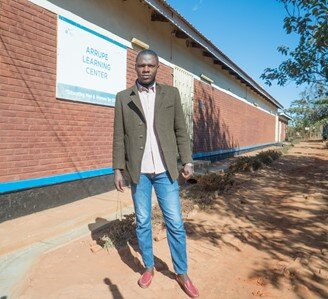 |
| Program-participant Stany is learning income-producing digital skills in Malawi. PHOTO: Jesuit Mission. |
The second phase of a visionary digital literacy program co-founded by an Australian Jesuit is set to launch in Dzaleka Refugee Camp in Malawi, where refugees have continued to seek asylum in great numbers during the Covid-19 pandemic.
The Digital Inclusion Program (DIP), run by Jesuit Refugee Service (JRS) Malawi and supported by Sydney-based Jesuit Mission, was piloted in Dzaleka in July 2019 in an effort to provide camp-bound refugees with digital income-generating skills. The camp, located in central Malawi, houses nearly 47,000 refugees and asylum seekers from countries including the Democratic Republic of Congo, Burundi, South Sudan, and Ethiopia, the vast majority of whom live below the moderate to the ultra-poverty line.
With few residents able to benefit from livelihood programs offered at Dzaleka, Australian Jesuit Fr David Holdcroft SJ, Professional and Post-Secondary Education Specialist at JRS International, launched the DIP in partnership with French non-profit technology start-up Konexio. One of the program’s primary goals is to enable participants to earn an income to supplement food rations, pay for health care, and support their families without simultaneously competing with the host community for scarce employment opportunities. With most of Dzaleka’s residents chronically unemployed, and with the global refugee resettlement rate drastically reduced in part due to the effects of Covid-19, such capacity-building is essential, says Fr Holdcroft.
“The average stay in a refugee state around the world is something like 26 years now, and that’s more than half a lifetime for many people,” he says.
“[But] while you have an isolated refugee camp, the internet enables us to remove that isolation… If you could imagine living in … a mud hut with a thatched roof, working online is a pretty radical thing, but what I tell the refugees there is that they’re competing with the best in the world. They’re no longer refugees when they’re doing that.”
 |
| Stany standing outside the Jesuit Refugee Service Malawi, Arrupe Learning Centre. PHOTO: Jesuit Mission. |
Students from an initial cohort of 60 graduated in October 2020, and several of them are already participating in the global employment marketplace. Stany, a 30-year-old refugee from the Democratic Republic of Congo, has been able to generate a steady income from freelance jobs – which he bid for and won on websites like Upwork and Fiverr – in translation, writing, graphic design, and administration support.
“I have learned that life is more than being a refugee, relying on food rations, and waiting for resettlement,” he says.
“The opportunity that the Digital Inclusion Program offered me allows me to earn my financial freedom by being self-employed online. My life is no longer the same.”
The program, which was unwittingly accelerated by Covid-19, trains refugees, asylum seekers, and members of the host community in skills including data entry, translation, formatting, transcription, and graphic design.

Post a Comment